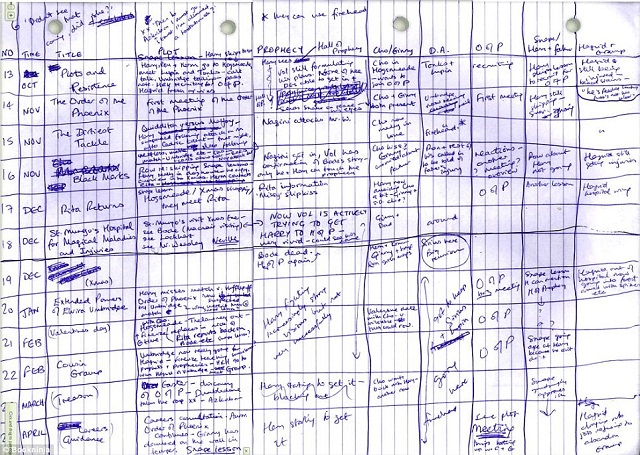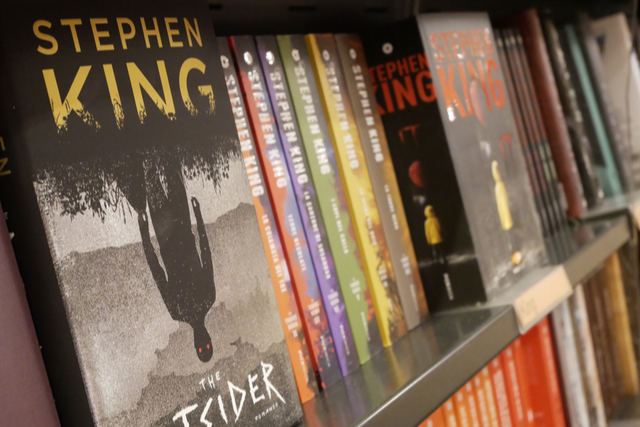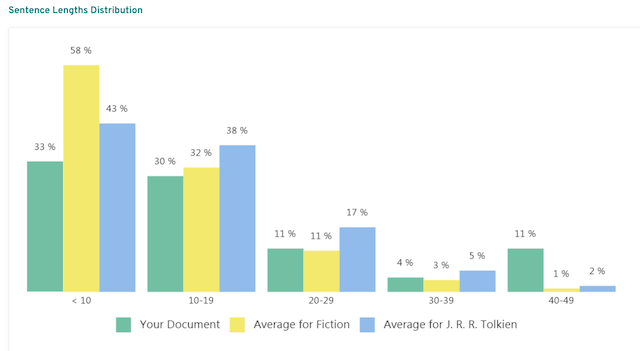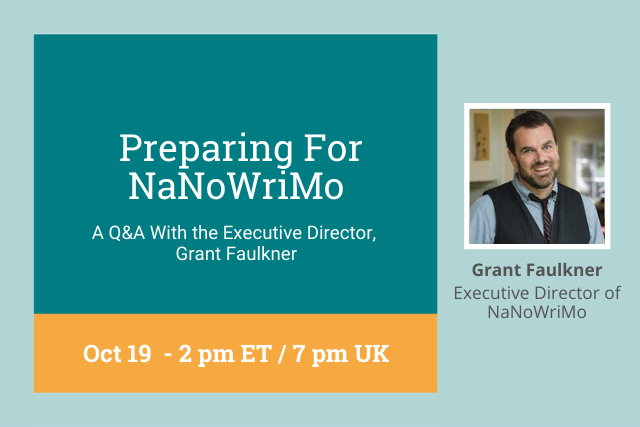
I set out on a quest to find if this world has more planners or pants-ers. Alas, there is no definitive answer, at least on the internet. I did, however, determine that most writing instructors ask their students who is a planner and who is a pants-er. This informal poll-taking reports about 50/50.
So, whether you're a planner or a pants-er, you're in good company. How do we know? Here are some famous authors who plan and those who fly by the seat of their pants.
Planners
If you love J.K. Rowling, she planned everything out in detail on paper. With a pen. Old school style. Here's what one of her outlines looked like:

Interestingly enough, she's quoted as saying, "I always have a basic plot outline, but I like to leave some things to be decided while I write." While this may verge on pants-ing to some, take a look at her "basic" outline again.
And of course, she's not the only one. R.L. Stine said, "If you do enough planning before you start to write, there's no way you can have writer's block. I do a complete chapter by chapter outline." He's such a prolific writer (having written over 300 books!) that he must know what he's talking about.
Another fairly prolific, hugely popular writer who plans his books is John Grisham. He said, "I don't start a novel until I have lived with the story for a while to the point of actually writing an outline and after a number of books, I've learned that the more time I spend on the outline the easier the book is to write. And if I cheat on the outline I get in trouble with the book."
Pants-ers
Stephen King said, "Outlines are the last resource of bad fiction writers who wish to God they were writing masters' theses." Ouch. Since he's closing in on 100 books that are wildly popular and widely read, he's certainly an expert. In fact, his stuff is so good that 58 of his books and stories have been made into movies or TV series adaptations. Can we just say, "wow."

Another highly respected writer who is an expert pants-er is Margaret Atwood. She said, "When I'm writing a novel, what comes first is an image, scene, or voice. Something fairly small. Sometimes that seed is contained in a poem I've already written. The structure or design gets worked out in the course of the writing. I couldn't write the other way round, with structure first. It would be too much like paint-by-numbers."
And last, but certainly not least, is Pierce Brown, the author of the best-selling Red Rising series, for which Universal Pictures acquired the rights for a film adaptation of the first book in a 7-figure auction. Pierce is doing OK for himself. He said, "Some writers are plotters… I, on the other hand, have the curse and rabid delight of being a pants-er. I sit down at my computer every day praying for a lightning strike. Common symptoms include pacing, an abnormally clean house, frantic cups of joe, and middle-of-the-night writing breakdowns."
Where does that leave the rest of us?
Jane Friedman published an interesting guest post by Jess Lourey on plotting versus pants-ing you can read here. In essence, Lourey says whether to use an outline or not depends on what works best for you.
And she's found that she writes differently when working with different genres. Sometimes she has to plan out what's going to happen; she needs that roadmap or she'll be stuck in the mire and never break free. Other times, planning just doesn't work, especially with her young adult novels and her magical realism novel, and she just sits down and writes.
As Lourey says, "My point is, don't trap your creativity in a label." You don't have to be a planner and you don't have to be a pants-er. Don't let anyone tell you how to write; you have to do the work, so make sure you do it the way that works best for you.
How Comparing Your Writing Makes You a Better Writer
ProWritingAid's new author comparisons feature allows you to select your favorite author and compare their writing to yours in the areas such as emotional tells, bad adverbs, sentence length variety and more.
(Please note: This feature is still in testing, and isn't available to all users yet. Here's a sneak preview of what's coming up!)
Most of the time, the age old advice to 'never compare yourself to others' rings true. The same goes for writing - your novel is your own. It's unique, and you don't want it to sound the same as everyone else's.
So why compare?
Let's say you're planning on writing a fantasy this NaNoWriMo. Chances are you have a solid grasp of the conventions of the genre. You've read all the big works, you've done your research. You know all of the elements of a good fantasy novel that you need to include in your manuscript. But once you actually get into writing, something just feels... off.
Sometimes these problems aren't with the overall arc of your story, but at sentence level. Comparing your writing to an author in your genre helps you experiment with different areas of your writing until it feels right. After all, who better to learn from than the masters?

We're not saying you need to match Tolkien's sentence lengths to write a good fantasy novel, or have the same proportion of unusual dialogue tags as John Grisham to write a great thriller. But having an idea of the techniques these authors use can help you move your writing in the right direction.
Conclusion
So this NaNoWriMo, if you sit down and write out the first several chapters then stall out, you may want to consider an outline of some sort. On the other hand, if words flow from your fingertips onto the page, then by all means, pants away.
And if or when you get stuck, try something new. Mix and match. Because finding out what works best for you will save your sanity in the long run.
Let us know in the comments below: are you a planner or a pants-er?
Preparing For NaNoWriMo: A Q&A With the Executive Director, Grant Faulkner
November is fast approaching, and with it comes National Novel Writing Month, the writing challenge that asks you to write a 50,000 word novel in 30 days.
We've asked the ultimate NaNo expert—NaNoWriMo Executive Director, Grant Faulkner—to share his advice. Join us for a Q&A and get all your questions answered.


